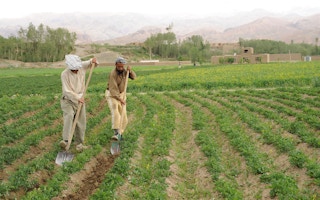Agriculture has always been the foundation of human population growth, from the Industrial Revolution to the rise of the Service industry. Yet, today, the agricultural sector is widely seen as archaic, plagued by inefficiencies across its lengthy and often opaque value chain, and faces numerous challenges.
As the sector combats an increasing global middle class population, an industry renaissance is necessary and perhaps already underway. Indeed, it is in digital advancement that we may find the driving force for a new age in the Agricultural sector. The Blockchain could very well be a key technology component that will drive this revolution and help address some of these issues.
But what is blockchain?
So what is Blockchain, and is it just hype or game-changing reality? Simply put, the Blockchain is a collective and public book keeping system maintained by a series of computers via the internet. It is the underlying infrastructure behind Bitcoin - the peer-to-peer digital crypto currency.
Through continuous, aligned logging, and cryptographic verification of every transaction, it creates an immutable structure that offers a high level of security and traceability and, thus, also trust and transparency.
In order to understand how Blockchain can be applied to agriculture, we have deconstructed the core components that could potentially make it such a disruptive technology.

What is Blockchain & what are its wider benefits to business? Source: KPMG research and analysis
With these attributes, Blockchain can reshape existing value chains by cutting away outdated and opaque processes, systems, and expensive middlemen.
So how can blockchain benefit the agricultural sector?
Today’s agricultural value chain is characterised by a large number of participants and touch points, thousands of processes, extensive manual paper-based practices, numerous products and infinite data. The entire value chain, from producer to buyer, is widely seen as complicated, segmented and opaque. This brings with it numerous problems, chief among them is a lack of efficiency, transparency, and consequently trust.

Today’s Agriculture Value Chain: An opaque and highly complex system. Source: KPMG research and analysis
Looking ahead, Blockchain is poised to turn Agriculture on its head and indeed, this transition has already begun. Today, innovative players in the sector have begun to use Blockchain technology to record the journey taken in production through the supply chain by utilising the power of a shared and secure ledger.

Three key benefits to the Agriculture sector. Source: KPMG research and analysis
Three key benefits of Blockchain to stakeholders across the agricultural value chain can be highlighted through how goods and produce are transported, tracked, and sold - both on an individual and corporate level.

Moreover, the benefits of Blockchain technology can promote huge efficiency and sustainability gains across the agricultural value chain. For instance, automated Blockchain payment systems reduce the need for agents, brokers, and vast physical documentation. Moreover, it also allows producers to better negotiate pricing by guaranteeing the quality of their goods and produce, simultaneously reducing the amount of counterfeit products in the market.
“
It is in digital advancement that we may find the driving force for a new age in the Agricultural sector.
Blockchain in agriculture: A nascent technological force
To date, the uptake of Blockchain in the agricultural sector is still nascent. There have, however, been a few noteworthy examples where this game changing technology has already had a profound impact on certain industries. One such example is the fishing industry.
Traditionally, the sale and purchase of tuna has only been accompanied by paper records and tags, which is a complicated, tedious and outdated tracking method. Such an approach makes the industry susceptible to fraud and other illicit practices. There have been many cases where buyers have found themselves procuring illegally caught fish.
In 2016, using mobile Blockchain technology and smart tagging to track fish, a pilot programme launched by a British company was able to successfully track tuna in Indonesia. This case illustrates a viable application of this technology to track goods securely without the need for a centralised data management system.
This capacity to validate the origin of the fish using smartphones is unprecedented and makes complex, global supply chains transparent and secure in a way that’s not been seen before. Now companies can ensure their buyers that they are in fact getting what they are paying for.
We are potentially on the cusp of something big
Clearly, Blockchain has potentially revolutionary capabilities to reshape an age old sector; but, it is still a nascent technology, with only a handful of practical applications having taken place to date. Companies are still struggling to understand how to best position themselves and leverage this new but complex technology. Indeed, there remains much to learn and understand about Blockchain for it to be truly impactful.
To meet the evolving trends outlined above, the agricultural sector must embrace the Digital Age. If executed correctly, it could be the catalyst for a second coming in the agricultural sector, helping to transform national economies and the rural sector. Indeed, if this can be achieved, we will be on the cusp of a potential industry game-changer.
Chris de Lavigne is principal, Global Strategy Group, Agribusiness, KPMG Singapore. Craig Rawlings is partner, Management Consulting, Supply Chain, KPMG Singapore. This post is republished from LinkedIn with permission.









